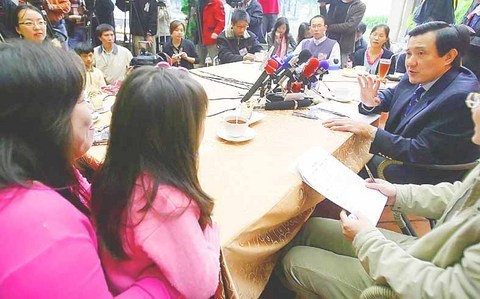Chinese Nationalist Party (KMT) Chairman Ma Ying-jeou (
Ma made the remarks during a tea party at 228 Memorial Park with eight citizens who won an online contest for a chance to meet with the chairman. He was responding to one participant's worries over the nation's slumping economy.
"Taiwan has the most advantageous position geographically, but the ban on direct flights and Chinese tourists has put Taiwan in an inferior position compared with many other Asian countries," Ma said.

PHOTO: WANG YI-SUNG, TAIPEI TIMES
Ma once again lauded the Mainland Affairs Council's (MAC) decision to allow Chinese tourists to visit Taiwan, and called on President Chen Shui-bian (陳水扁) "not to interfere with the Executive Yuan's decision this time."
Ma said that allowing Chinese tourists to visit could revitalize the local tourist and service industries and create more opportunity for cross-strait exchanges. He also suggested that the government should allow Chinese students to attend college in Taiwan.
Participant Shi Jing-chuan (
But Ma defended the meeting.
"What the KMT is doing now is to build a bridge between Taiwan and China. If the DPP government is willing to walk on the bridge, then there will be positive development," Ma responded.
Besides serious issues, participants at tea party also asked about how to keep one's hair black, how to teach kids about relationships and the secret to achieving a high "EQ" or emotional quotient. Housewife Fang Ching-mei (方靜鎂) praised Ma's "charming eyes" for "making me shy when looking at me" as the chairman was answering her question, and even tried to kiss Ma when having her picture taken with him.
In response to participants' curiosity and passion, Ma lauded their input on economic and political issues.
"They shared some deep thoughts and questions on some key issues. People who are in power should never ignore the voice of our citizens or treat them as idiots," he said.

‘DENIAL DEFENSE’: The US would increase its military presence with uncrewed ships, and submarines, while boosting defense in the Indo-Pacific, a Pete Hegseth memo said The US is reorienting its military strategy to focus primarily on deterring a potential Chinese invasion of Taiwan, a memo signed by US Secretary of Defense Pete Hegseth showed. The memo also called on Taiwan to increase its defense spending. The document, known as the “Interim National Defense Strategic Guidance,” was distributed this month and detailed the national defense plans of US President Donald Trump’s administration, an article in the Washington Post said on Saturday. It outlines how the US can prepare for a potential war with China and defend itself from threats in the “near abroad,” including Greenland and the Panama

The Chinese Nationalist Party (KMT) is maintaining close ties with Beijing, the Democratic Progressive Party (DPP) said yesterday, hours after a new round of Chinese military drills in the Taiwan Strait began. Political parties in a democracy have a responsibility to be loyal to the nation and defend its sovereignty, DPP spokesman Justin Wu (吳崢) told a news conference in Taipei. His comments came hours after Beijing announced via Chinese state media that the Chinese People’s Liberation Army’s Eastern Theater Command was holding large-scale drills simulating a multi-pronged attack on Taiwan. Contrary to the KMT’s claims that it is staunchly anti-communist, KMT Deputy

RESPONSE: The government would investigate incidents of Taiwanese entertainers in China promoting CCP propaganda online in contravention of the law, the source said Taiwanese entertainers living in China who are found to have contravened cross-strait regulations or collaborated with the Chinese Communist Party (CCP) could be subject to fines, a source said on Sunday. Several Taiwanese entertainers have posted on the social media platform Sina Weibo saying that Taiwan “must be returned” to China, and sharing news articles from Chinese state media. In response, the Mainland Affairs Council (MAC) has asked the Ministry of Culture to investigate whether the entertainers had contravened any laws, and asked for them to be questioned upon their return to Taiwan, an official familiar with the matter said. To curb repeated

Myanmar has turned down an offer of assistance from Taiwanese search-and-rescue teams after a magnitude 7.7 earthquake struck the nation on Friday last week, saying other international aid is sufficient, the National Fire Agency said yesterday. More than 1,700 have been killed and 3,400 injured in the quake that struck near the central Myanmar city of Mandalay early on Friday afternoon, followed minutes later by a magnitude 6.7 aftershock. Worldwide, 13 international search-and-rescue teams have been deployed, with another 13 teams mobilizing, the agency said. Taiwan’s search-and-rescue teams were on standby, but have since been told to stand down, as